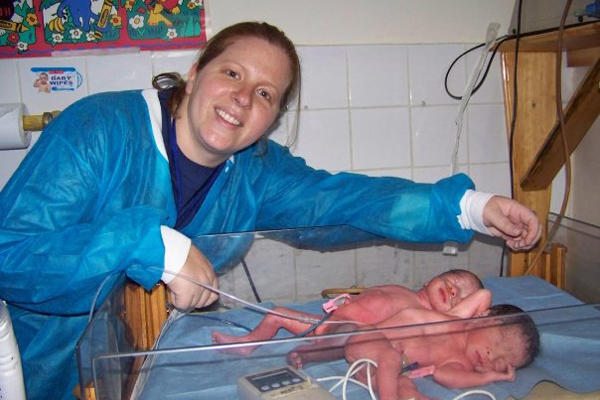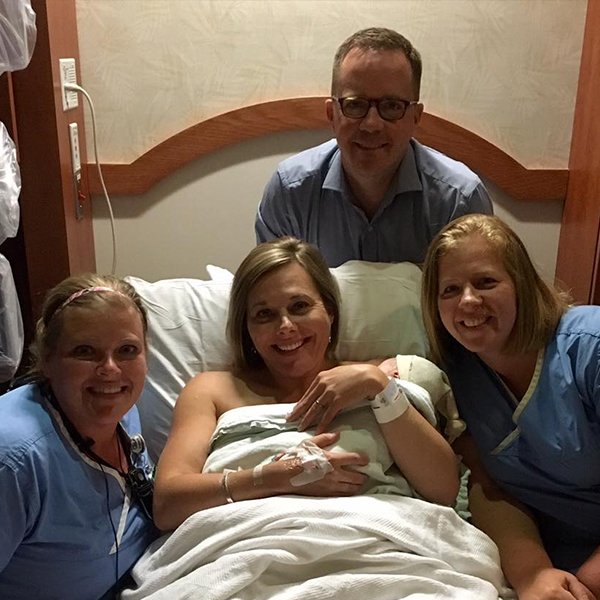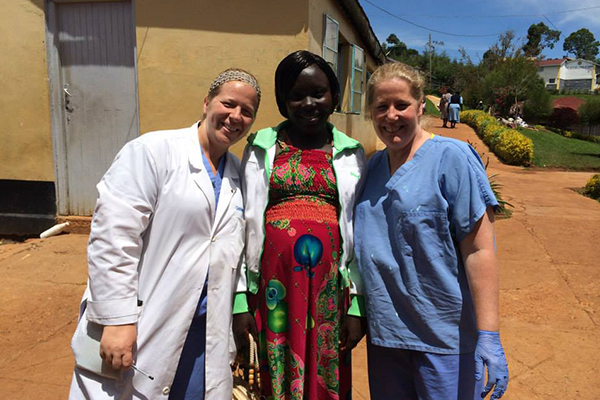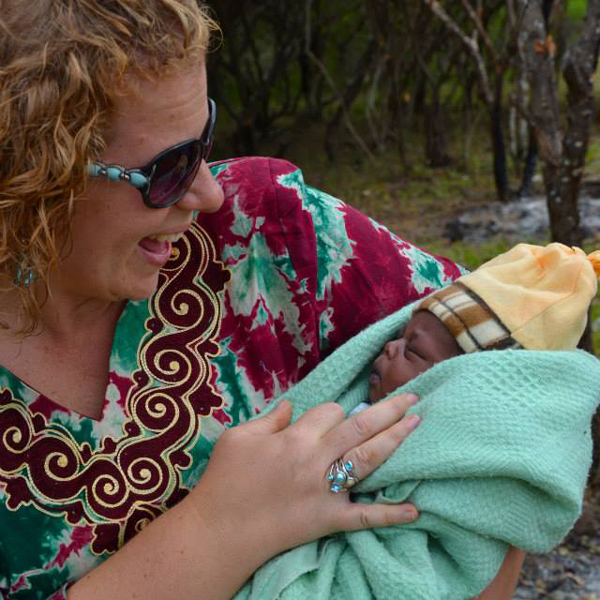Name: Christina Francis, MD
Specialty: PPG – OB/GYN Hospital Medicine
Schooling: Bachelor’s degree from Ball State University, Muncie, IN, 2000; Medical degree from Indiana University School of Medicine, Indianapolis, IN, 2005; OB/GYN residency at St. Vincent Hospital Indianapolis, IN, 2009
What made you want to become a doctor?
There wasn’t really a single event that led me to the medical profession. I had always enjoyed science and helping people. I grew up living at an inner-city ministry that my parents helped run and so, from a young age, I realized the importance of giving back and helping others. Medicine seemed to be the perfect combination of the things I valued and what I was good at.

How did you select your specialty?
When I started medical school, I don’t think that OB was even on my radar. I wanted to do full-time medical missions, and so I was more focused on what I saw as the broader specialties, such as Family or Internal Medicine. In my second year of medical school, I was shadowing a family physician and had the opportunity to go with him to a delivery. I’d never seen a delivery before and I remember being a little nervous but also excited at the same time.
At the moment of delivery, I was overwhelmed by the miracle of it all, and how beautiful it was. I started to cry a little, and a seasoned Labor & Delivery nurse who was in the room saw that. She leaned over to me and whispered, “Oh honey, if this makes you cry you need to do this for a living!” Little did she know that that one statement would change my trajectory.
I couldn’t stop thinking about that and as I progressed through my clinical rotations, I realized she was right. All other rotations paled in comparison to my OB/GYN rotation. I realized that OB gave me great training for the medical mission field and also provided the opportunity for me to deliver compassionate care to women in all aspects of their lives. I can’t imagine having done anything else!

Is there a moment or exchange with a patient that significantly impacted your life?
I have learned so many things from my patients over the years, however, one special patient not only made a significant impact, but also continues to be a part of my life. Her mother came to me as a new patient at the beginning of her pregnancy. During her first trimester ultrasound, a large cystic hygroma was found – not a good finding, especially in the first trimester. Genetic testing revealed that she (the baby) had Down Syndrome. Future ultrasounds showed that she also had a congenital heart defect and she gradually began to develop diffuse hydrops, which included a pericardial effusion, pleural effusions and massive ascites.
Her mom was told by the high risk specialist that her child had a less than 5 percent chance of surviving the pregnancy, and less of chance after birth. As her condition worsened on each visit, her mom prepared for the loss of her baby. Until approximately 28 weeks, when we all got a surprise on her ultrasound. My ultrasonographer came into my office with a stunned look on her face. Knowing who she had just seen, I waited for the bad news.
“Is she gone,” I asked?
“No,” she responded. “All the fluid is gone!”
At first, I wasn’t sure what she meant, but as I looked at the images, I saw that not only had her hydrops completely resolved, but you could barely even see the cystic hygroma either. She had grown since her last visit and was looking better than she had ever looked. As I went into the exam room, to a very stunned patient, and rejoiced with her over this improvement, we also discussed that there was no medical explanation for this improvement and it could truly only be a miracle.
On delivery day, her little girl came out screaming. Before mom was discharged from the hospital, I was honored to be asked to be the child’s godmother, a position I gladly accepted. She has had her health issues, and corrective heart surgery, but she turns five this year and has been a blessing not only to her family, but also to all who come into contact with her, including me.
So what impact did this precious girl have on my life? The biggest thing she taught me is that even though we have a lot of medical knowledge as physicians and such thorough training, we are still human beings and we certainly do not know everything. We work off of our best knowledge, but we need to remember that our patients are human beings with value, regardless of their abilities, and that they don’t always behave according to our statistics.
What is the best piece of advice you could give a new mother?
Since I’m not a mother myself, I would take my advice when it comes to parenting with a grain of salt, but in my experience, being with new mothers the first time they see their child and face the prospect of the journey of actually raising them beginning, I would say to just know that everyone starts out not having a clue what they’re doing. You’ll figure it out. Don’t be afraid to ask for help and surround yourself with support. As your kids get older, they will be best served by you being their parent first and foremost and their friend second.

How did you get involved in mission work?
I was raised at an inner-city ministry, which provided many much needed services to a lower income community in southern Indiana. So, I guess you could say that mission work was kind of in my blood from a young age.
My first cross-cultural missions experience was the summer of 1996, right after I’d graduated high school (oops! I just gave away my age). I went with my church youth group to build two houses in Juarez, Mexico. It was an amazing experience that left me wanting more. In 1998, I traveled to Romania for a summer, where I worked and lived in an orphanage. Even though I wasn’t specifically doing medical work, I was able to see the significant disparity in health care in a post-Communist country. That really sparked a fire in me to pursue medicine in order to reach out to those who have little to no access to quality health care. This led to several other trips to Romania (including a year living there in between undergrad and medical school), Myanmar, Afghanistan and Kenya, where I also spent 3 years working after completing residency.
What is the most rewarding part of serving these populations?
I think the thing that stands out most clearly is how grateful they often are for even the simplest of things. In my experience, they aren’t immediately skeptical or demanding. The people I have served (and who have taught me so much as well) in these settings often come great distances for care and are so thankful to have someone sit down and listen to them, as well as provide thoughtful care for them. They often don’t seek medical care until whatever concern they have is advanced, and so most interventions are immediately rewarding, which is intensely gratifying for physicians.
The other thing I enjoy about practicing in low resource settings is that, because you don’t have a lot of labs or imaging studies to rely on, you really hone your physical exam skills and actually look at the patient to make a diagnosis.

Do you know how many babies you’ve delivered? In how many different countries?
I’d love to know the number! I know that as of 2 years out of residency, I’d delivered about 1,500 babies. Since then, I haven’t kept track, but I sure wish I had! I have delivered babies in 3 countries on 3 different continents.
After all of those deliveries, is there anything that still surprises you about the birthing process?
There are actually! No matter how many deliveries I do, I’m amazed that in some way, every delivery is different. Every mom experiences different things. Every dad experiences his own unique emotions. Every baby behaves differently. While there are many similarities, each delivery is still as unique as the child that is born. I often use this to encourage women not to let anyone else make them feel bad if they didn’t have the exact birth experience they wished they would have. My goal is always healthy mom, healthy baby! How we get there often looks different for each family.
What is your greatest passion outside of work?
I came back to the U.S. from Kenya (where I honestly thought I’d spend the rest of my career) for an equally important mission – to advocate for the rights of unborn children. As an obstetrician, I have two patients I’m caring for during a pregnancy and it is my duty to care for both of them to the best of my ability.
What’s something people would be surprised to know about you?
I had always had a bit of a pipe dream of rehabbing an old house. Well, that pipe dream became a reality in 2017. I refurbished a 1920 home in the South Wayne neighborhood from the studs. It involved major renovation work to the outside of the home as well. It was a 13-month long process, but well worth it as I now have a historic home I love and accomplished something I could have never imagined would actually happen.
If you could tell people to read one book in their lifetime, which would it be and why?
The Bible. It is an essential part of my life, how I know that my life has meaning and that God exists. It is also a book that contains every good aspect of literature – adventure, drama, comedy, poetry, allegory and ultimately redemption.
What would we find at the top of your bucket list?
A whiskey and castle tour of Scotland and Ireland.
What’s your personal motto?
I don’t have a motto, per say, but I do have a verse that I try to live by. It comes from Proverbs 31:8-9: “Speak up for those who cannot speak for themselves, for the rights of all who are destitute. Speak up and judge fairly; defend the rights of the poor and needy.”
